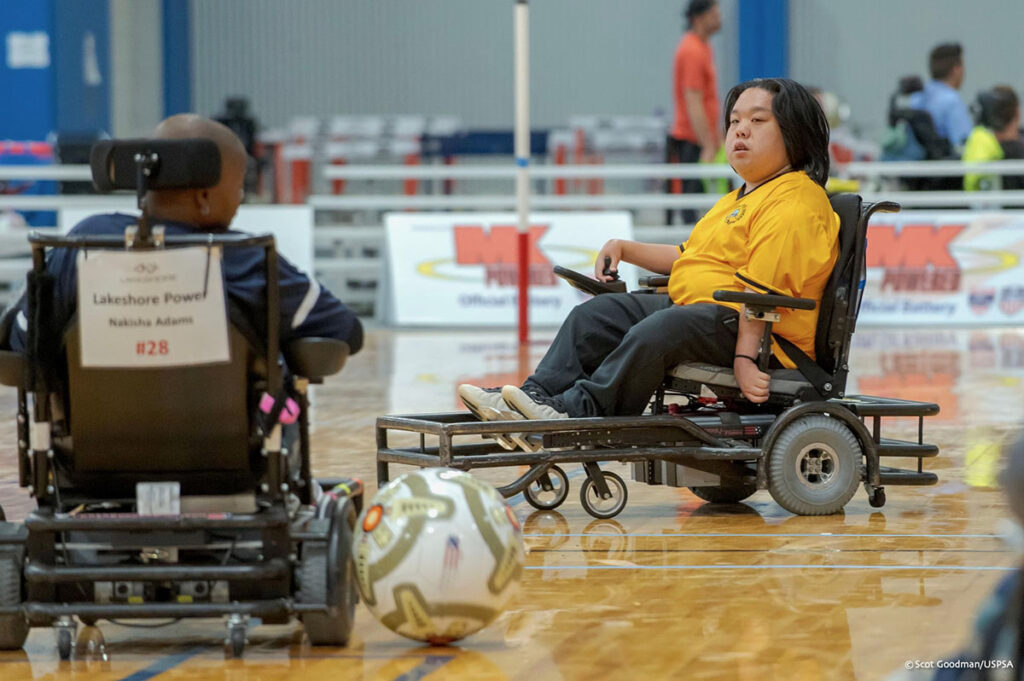“Imagine bumper cars mixed with pinball and you'll get a good idea of what power football is,” jokes the San Francisco coach. But it's actually harder than it looks.
The whir of specialized motorized wheelchairs, the squeal of skidding wheels and the clang of oversized footballs echoed through the gym at the Eureka Valley Recreation Center on a lazy Saturday in the Castro district. It's summer vacation, but three members of the Golden State Ducks, San Francisco's power football team, fresh off a successful 2024 season, are still there to practice.

Stanley Quan, who has been playing for more than 10 years, participated in Team USA's Power Soccer Camp in Eagan, Minnesota, this week, which is an “unofficial tryout” for the National Power Soccer Team that will compete in international tournaments.
Power soccer generally follows the same rules as traditional soccer, but is played indoors on a basketball court using specialized wheelchairs, with four players per team on the field at any one time.
A year ago, the 30-year-old Quan got a call from the president of the United States Power Soccer Association, telling him to prepare for a training camp call-up where he'd have the chance to play with some of the best recruits from around the country. He's been training for this moment ever since. “That was the fuel that motivated me to step up and play at the highest level.”
“We're treated like real athletes,” Quan said of the camp supported by the U.S. Soccer Federation. “It feels really good.”
Details of the official national team roster have yet to be released, but Quan believes there is a good chance they will qualify for the tournament. The next international tournament, he said, will be the Copa America Cup, a powerhouse soccer tournament to be held in Uruguay in 2025.

Quan is not the first Golden State Duck to compete in the Power Soccer World Cup. Brothers Jairo and Omar Solorio helped Team USA win the inaugural Power Soccer World Cup in Japan in 2007. Omar repeated the feat in 2011.
Quan first encountered power football in 2012 as head coach of a Berkeley team organized by the Bay Area Outreach and Recreation Program. “Ever since then, I was looking for an outlet to channel my competitive spirit,” he says.
Co-founder Bart Stawicki pitched the Golden State Ducks to Quan a few years ago, offering him a chance to join a player-driven team with an “aggressive style of play.” Most of the other 40 competitive teams in the country are run by organizations or families.
The sport has changed a lot since Stawicki and team co-founder and team manager Max Brown first played together in high school in New Jersey, using borrowed, non-purpose wheelchairs with plastic bumpers instead of metal. These days, new teams are popping up all over the country, giving a community to a growing number of people with disabilities, Brown said.

The Golden State Ducks are supported by the San Francisco Recreation and Parks Department's Therapeutic Recreation and Inclusion Services division, which provides gym space and equipment. Several of the eight team members live in the city and range in age from 21 to 50. The rest commute from the Bay Area.
This season they'll compete in the league's top division for the first time with the national championship game being played in Indiana. Until then, they're focused on expanding their team and taking their game to the next level.
For experienced players, controlling a power chair is second nature, and they seem equally comfortable moving back and forth in a “highly responsive” wheelchair that would cause a shaky, jerky motion in an inexperienced user.
Quan said able-bodied players typically don't think much about controlling their bodies, whereas power soccer players often play “two games at the same time,” mastering both chair control and knowledge of the game.

“It's like the chair has become an extension of my body,” Quan said. Just by feeling the ball on the chair, he can tell how it will bounce. He can spin around to hit the ball at just the right angle and no longer get dizzy.
Recruitment to the Ducks is largely by word of mouth, with team members often leaving their business cards at medical clinics and other places where people with disabilities are likely to congregate, Stawicki said.
“If we see a disabled person on the street, we just give them a card,” laughed the players, who took part in a training session on July 20. Not many people know about the sport, but once they try it, “it's hard to stop,” the players added.
For more information about the league, contact goldenstateducks@gmail.com.


